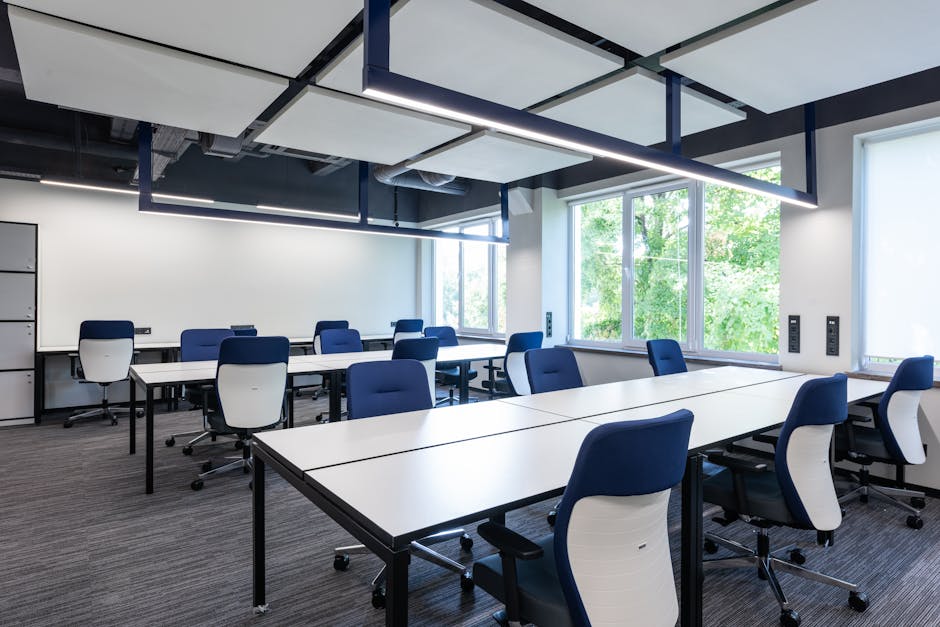The Ultimate Guide to Office Hoteling: Revolutionizing Workplace Management
"This comprehensive guide explores the rise of office hoteling in hybrid workplaces, its benefits for both employers and employees, and how to choose the right office hoteling software. Learn how this innovative approach is reshaping the future of work, promoting flexibility, and optimizing resource utilization. "

The Ultimate Guide to Office Hoteling: Revolutionizing Workplace Management
In today's rapidly evolving business landscape, the concept of office hoteling has emerged as a game-changer for organizations embracing hybrid work models. This comprehensive guide will explore the ins and outs of office hoteling, its benefits, and how to implement it effectively using cutting-edge software solutions.

What is Office Hoteling?
Office hoteling is a flexible workplace strategy that allows employees to reserve workspaces, such as desks or meeting rooms, on an as-needed basis rather than having assigned permanent spaces. This approach is particularly well-suited for hybrid work environments, where employees split their time between remote and in-office work.
The Rise of Hybrid Work
Recent studies indicate that nearly three-quarters of U.S. companies are either already using or planning to implement hybrid work models. This shift towards flexibility has been driven by employee preferences and the need for organizations to adapt to changing work dynamics.
Benefits of Office Hoteling
Implementing an office hoteling model offers numerous advantages for both employers and employees:
-
Increased Productivity: By allowing employees to choose their work environment, office hoteling can boost productivity and focus.
-
Cost Savings: Organizations can significantly reduce overhead costs associated with maintaining underutilized office space.
-
Enhanced Collaboration: Flexible seating arrangements promote cross-departmental interactions and foster innovation.
-
Improved Employee Satisfaction: The freedom to choose when and where to work contributes to better work-life balance and job satisfaction.
-
Optimized Space Utilization: Office hoteling helps maximize the use of available workspace, especially in high-rent urban areas.

Implementing Office Hoteling with Software Solutions
To successfully adopt an office hoteling model, organizations need robust software solutions that streamline the process. Here are key features to look for in office hoteling software:
1. User-Friendly Booking System
The software should offer an intuitive interface for employees to easily reserve workspaces, meeting rooms, and other resources.
2. Real-Time Availability
Up-to-date information on available spaces helps employees make informed decisions and prevents double-bookings.
3. Integration Capabilities
Look for software that integrates seamlessly with your existing tools, such as calendar applications and communication platforms.
4. Reporting and Analytics
Comprehensive data on space utilization can help organizations make informed decisions about their office layout and capacity.
5. Mobile Accessibility
A mobile app allows employees to manage their reservations on-the-go, enhancing flexibility and convenience.
Best Practices for Office Hoteling Success
To ensure a smooth transition to office hoteling, consider the following best practices:
-
Clear Communication: Educate employees about the new system and provide training on how to use the software effectively.
-
Flexible Policies: Develop guidelines that balance structure with flexibility to accommodate various work styles and needs.
-
Regular Feedback: Continuously gather input from employees to refine and improve the office hoteling experience.
-
Technology Infrastructure: Ensure your office is equipped with the necessary technology to support a seamless hoteling experience, including reliable Wi-Fi and building strong employer-employee relationships through effective communication tools.
-
Cleanliness and Sanitization: Implement rigorous cleaning protocols to maintain a hygienic environment, especially in shared spaces.

The Future of Work: Flexibility and Adaptability
As we look ahead, it's clear that workplace flexibility will continue to be a crucial factor in attracting and retaining top talent. Office hoteling is not just a temporary trend but a fundamental shift in how we approach workspace management.
By embracing office hoteling and investing in the right software solutions, organizations can create dynamic, efficient, and employee-centric workplaces that are ready for the future of work. This approach not only optimizes resource utilization but also promotes a culture of trust and autonomy, leading to higher employee satisfaction and productivity.
In conclusion, office hoteling represents a significant opportunity for businesses to reimagine their workplace strategies. By leveraging technology and focusing on employee needs, organizations can create flexible, collaborative environments that drive success in the hybrid work era.
Remember, the key to a successful office hoteling implementation lies in choosing the right software, establishing clear policies, and maintaining open communication with your team. With these elements in place, you'll be well-positioned to thrive in the evolving landscape of modern work.
Want to learn more about Hybrid Work?
Explore our complete guide with more articles like this one.


